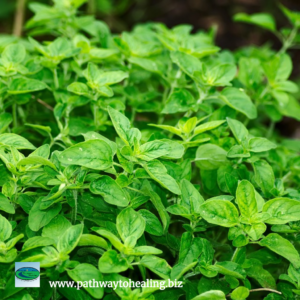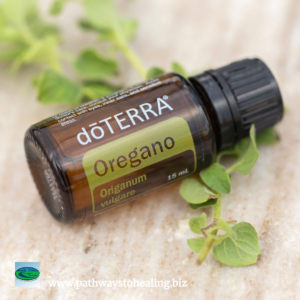February 21, 2019
By: Dr. Alyssa Musgrove
 If you’ve ever made Italian food, you’ve likely reached for dried oregano to add Mediterranean flavor to your favorite sauce. But this humble herb can be used for much more than simply flavoring your favorite dishes. In the world of essential oils, oregano oil is a powerful tool that provides a wide variety of healing benefits and uses.
If you’ve ever made Italian food, you’ve likely reached for dried oregano to add Mediterranean flavor to your favorite sauce. But this humble herb can be used for much more than simply flavoring your favorite dishes. In the world of essential oils, oregano oil is a powerful tool that provides a wide variety of healing benefits and uses.
To create oregano oil, medicinal grade oregano is distilled to extract the essential oil from the herb, which is where a high concentration of the herb’s active ingredients are found. When made into a medicinal supplement or essential oil, oregano is often called “oil of oregano.” Oil of oregano contains two powerful compounds called carvacrol and thymol, both of which have been shown in studies to have strong antibacterial and antifungal properties.
In fact, oregano oil may rival antibiotics when it comes to treating and preventing various infections. In 2011, the Journal of Medicinal Food published a study that evaluated the antibacterial effect of oregano oil against five types of bad bacteria. Oil of oregano showed significant antibacterial properties against all five species. The highest activity was observed against E. Coli, which suggests that oregano oil could potentially be used to promote gastrointestinal health and to prevent food poisoning. (When traveling internationally, I always pack oregano oil capsules to help fight foreign germs I may come in contact with.)
Another study found that a combination of heat, salt and use of essential oils (including oregano) had effects against strains of bacteria that commonly cause the fungal infection known as athlete’s foot. After testing the fungicidal activity of 11 essential oils against the bacteria known to cause athlete’s foot, oregano oil was found to be the most powerful (followed by thyme, cinnamon, lemongrass and clove).
 Oregano essential oil also helps balance bacteria and fight yeast overgrowth, making it a popular natural treatment for Candida and small intestine bacterial overgrowth (SIBO). (SIBO is a common digestive problem that causes gas, bloating and intolerances to many carbohydrate-containing foods.) Oregano oil hinders bacterial replication and can be used for treating infections that affect digestive health and nutrient absorption. Thymol, one of oregano’s active compounds, may help relax the soft tissue of the throat and stomach, which can help to decrease GERD, heartburn and discomfort after eating.
Oregano essential oil also helps balance bacteria and fight yeast overgrowth, making it a popular natural treatment for Candida and small intestine bacterial overgrowth (SIBO). (SIBO is a common digestive problem that causes gas, bloating and intolerances to many carbohydrate-containing foods.) Oregano oil hinders bacterial replication and can be used for treating infections that affect digestive health and nutrient absorption. Thymol, one of oregano’s active compounds, may help relax the soft tissue of the throat and stomach, which can help to decrease GERD, heartburn and discomfort after eating.
Oregano oil is safe as long as it’s diluted in water or with a carrier oil (some of my top choices are jojoba, olive and coconut oils). The ideal ratio when diluting this herbal oil is one part oregano oil to three parts carrier oil. Before using oregano oil, be sure to conduct a spot test to check for allergic reactions. Simply apply a diluted drop on your arm and see if any irritation occurs. Oregano oil can be used topically, diffused or taken internally.
Ideally, you want to purchase 100 percent pure, unfiltered, Certified USDA Organic oregano oil. If taking internally, the oil must be 100 percent therapeutic grade. The oil is very strong and hot, so start with less and add more as needed. Be careful when buying oregano oil, as some manufacturers sell adulterated oils and oils made from thyme, Spanish oregano, or cultivated oregano, which DO NOT provide any health benefits.
 I take oregano essential oil internally for a maximum of two weeks, in most cases, because it’s so powerful. When taking oregano oil internally, it should always be diluted with water or mixed with coconut oil. I find it’s helpful to combine oregano oil with olive oil in capsules to avoid burning the throat. Oregano oil is also available as soft gels or capsules to take internally without the mess of trying to make your own capsules.
I take oregano essential oil internally for a maximum of two weeks, in most cases, because it’s so powerful. When taking oregano oil internally, it should always be diluted with water or mixed with coconut oil. I find it’s helpful to combine oregano oil with olive oil in capsules to avoid burning the throat. Oregano oil is also available as soft gels or capsules to take internally without the mess of trying to make your own capsules.
The dried herb oregano is typically fine for pregnant women but, generally speaking, it is not considered safe to use oregano oil during pregnancy. If side effects, such as nausea, dizziness or an allergic reaction are ever experienced, then stop using oregano oil immediately and consider seeing a doctor. Because oregano oil might interfere with other medications, always ask your doctor if it’s safe for you to take it internally. Some people may experience stomach upset when ingesting oregano oil (or even the herb itself). Those who are allergic to plants from the Lamiaceae family (mint, lavender, sage and basil) should also avoid this oil, as they may also develop an allergic reaction.
 Pathways to Healing specializes in holistic chiropractic care. Dr. Alyssa Musgrove draws on a variety of techniques, including chiropractic, kinesiology, nutrition, food allergy testing and lifestyle counseling to assist clients in achieving optimal health and wellness in one setting. Pathways to Healing is located at 1022 Founders Row, Lake Oconee Village, Greensboro. The office can be reached at 706-454-2040.
Pathways to Healing specializes in holistic chiropractic care. Dr. Alyssa Musgrove draws on a variety of techniques, including chiropractic, kinesiology, nutrition, food allergy testing and lifestyle counseling to assist clients in achieving optimal health and wellness in one setting. Pathways to Healing is located at 1022 Founders Row, Lake Oconee Village, Greensboro. The office can be reached at 706-454-2040.